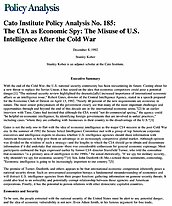With the end of the Cold War, the U.S. national security community has been reexamining its future. Casting about for a new threat to replace the Soviet Union, it has seized on the idea that economic competitors could pose a potential danger.[1] “The national security review highlighted the dramatic[ally] increased importance of international economic affairs as an intelligence issue,” Robert Gates, director of the Central Intelligence Agency, stated in a speech prepared for the Economic Club of Detroit on April 13, 1992. “Nearly 40 percent of the new requirements are economic in nature. The most senior policymakers of the government clearly see that many of the most important challenges and opportunities through and beyond the end of this decade are in the international economic arena.”[2] In an earlier interview with Time, Gates had insisted that although the CIA would “not do commercial spying,” the agency could “be helpful on economic intelligence, by identifying foreign governments that are involved in unfair practices,” including cases “where they are colluding with businesses in their country to the disadvantage of the U.S.”[3]
Gates is not the only one to flirt with the idea of economic intelligence as the major CIA mission in the post-Cold War era. In the summer of 1992 the Senate Select Intelligence Committee met with a group of top American corporate executives and intelligence experts to discuss whether U.S. intelligence agencies should share information with American businesses to help give them an advantage in an increasingly competitive global market. Although opinion was divided on the wisdom of such a strategy–and the lengths to which the CIA should go to obtain and disseminate information if it did undertake that mission–there was considerable enthusiasm for general economic espionage. Most participants embraced the logic expressed earlier by former CIA director Stansfield Turner, who told the committee that economics “is a primary area of intelligence in the 1990s.” He asked rhetorically, “If we spy for military security, why shouldn’t we spy for economic security?”[4] Sen. John Danforth (R‑Mo.) echoed those sentiments, contending, “Economic intelligence is going to be increasingly important to our country.”[5]
The premise of Turner, Danforth, and others appears to be that international economic competition inherently poses a national security threat. Such an unwarranted assumption betrays a fundamental misunderstanding of economics and will distract U.S. intelligence agencies from their proper function: gathering information on genuine security threats. It could also lead to an unhealthy and potentially corrupt relationship between those agencies and American corporations. Finally, it has the potential to poison relations with other democratic capitalist countries.

This work is licensed under a Creative Commons Attribution-NonCommercial-ShareAlike 4.0 International License.
